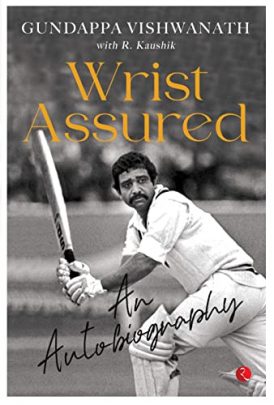Wrist Assured
Martin Chandler |Published: 2022
Pages: 267
Author: Viswanath, Gundappa
Publisher: Rupa
Rating: 4 stars

There probably isn’t a single person anywhere in the world who can truly be said to be universally liked, let alone a sporting celebrity, but former Indian batsman Gundappa Viswanath must be as close as anyone gets. Until now however the genial ‘Vishy’ had been the subject of just one modest privately published hagiography that appeared just as his Test career ended. That slim paperback is virtually unprocurable today, so a full account of the life and career of this immensely popular septuagenerian was therefore long overdue.
I first saw Vishy bat in 1971, and he came back to England in 1974, 1979 and 1982. He has a reasonable record in England, albeit not quite as good as it might have been. The runs he did make in his 13 Tests here (858 at 39.00) were all made with great style though, and he always had a smile on his face, even if dismissal sometimes rendered that a little rueful.
Wrist Assured is an apt title for a book that is a very traditional sort of cricketing autobiography, and before anything is read into that comment it is intended as a compliment. There is something conveyed of the stresses of the Indians’ disappointing 1974 visit, but in the unlikely event that he does actually have scores to settle Vishy certainly doesn’t seek to so in print, and any criticism that comes the way of anyone amounts to the mildest of rebukes.
And no one would expect it to be any other way. Vishy was a man who always played the game in the best spirit and, certainly in England, he is as well known for that as for the way in which, despite his lack of inches, he went about the business of blunting the best pace attacks of the 1970s. The story of how he, on reflection, recalled Bob Taylor to the crease after he had been adjudged caught behind at a crucial stage in the Jubilee Test at the Wankhede in 1980 has never been forgotten in England, and it was no surprise to read exactly what his feelings on that incident were, and on the spirit of the game generally, including that vexed question of ‘to walk or not to walk’.
But the main focus of Wrist Assured is the story of a fine playing career. Vishy has a very good memory for detail and the patience to have spent what must have been many hours discussing men and matches with his ghost, R Kaushik. Credit to Kaushik too for showing the same diligence and for his ability to get so much detail and insight from his subject, a skill that first became apparent in his book about VVS Laxman.
Wrist Assured contains all the background information a reader would expect, and Vishy’s memory of events of half a century or more ago is put to the test as he recalls his feelings as a schoolboy cricketer, on scoring a double century on First Class debut, and not so very long afterwards the very different reaction to the duck he recorded in his first Test innings, and also his redemption with a century in the second innings.
Vishy was a member of the Indian side who, in the early 1970s, won in the Caribbean and then back to back series against England in 1971 and 1972/73. On a purely personal level Vishy struck his best form later in the 1970s, before a grim time in Pakistan in 1982/83 saw the end of a 91 Test career, but every series is looked at.
A good autobiography needs more than a full account of a man’s career of course, and Vishy certainly provides that. He sets out his views on other top Indian players, including those from the generations that came after him. Pride of place goes to brother in law Sunny Gavaskar, both as a cricketer and as a man. Vishy doesn’t give too may glimpses into his private life but does, in an unusual initial chapter, take a sentimental look back at his seventieth birthday party, in the course of which he acknowledges the role that Sunny played in helping him overcome the issues with alcohol that had affected him in middle age.
In conclusion Wrist Assured is an excellent book, and deserves to be widely read. It contains a good selection of photographs and only lets itself down by a little not having an index or any sort of statistical appendix, but that certainly isn’t Vishy’s fault.







Leave a comment